Artificial intelligence (AI) in the automotive industry alters how we view and use cars and transportation. AI makes vehicles safer, smarter, and more efficient. Engineers now leverage AI to build autonomous cars, upgrade safety systems, and augment the driving experience.
AI transforms the car industry by powering smart driver aids, forecasting maintenance needs, and tailoring in-car experiences for individual drivers. These breakthroughs boost road safety and redefine our connection with vehicles. With voice-activated entertainment and AI-backed directions, modern cars now act like mobile personal assistants.
AI influences much more than the cars we drive. It reinvents production methods, optimizes logistics, and changes how automakers promote their brands. As AI technology advances, the auto industry will likely undergo even more dynamic and surprising shifts.
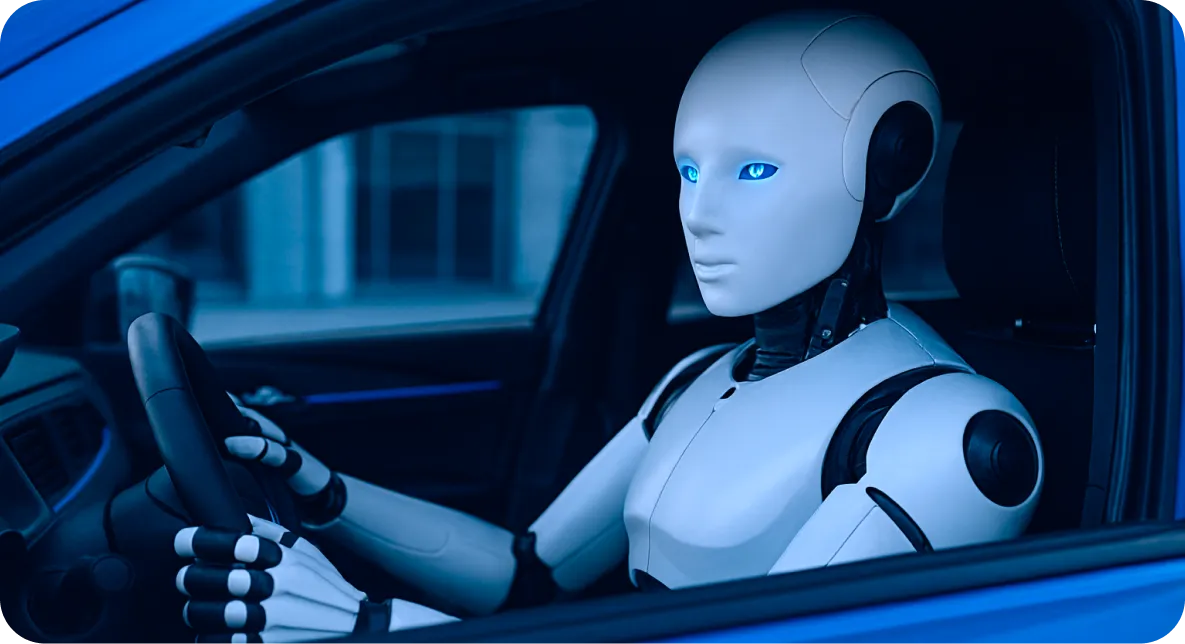
What Is AI in the Automotive Industry?
AI in the automotive industry is applying cutting-edge machine learning, deep learning, and computer vision tools to improve vehicle design, production efficiency, performance, and user interaction. Relying upon AI models and data analysis, carmakers and tech firms manufacture more intelligent, secure, and energy-efficient automobiles that adjust to shifting conditions and driver needs.
The Top 16 Best Use Cases for AI in Automotive Settings
Artificial intelligence is redefining the automotive industry with waves of innovation that affect safety, performance, user experience, and operations. From adaptive cruise control and automatic braking to predictive maintenance and autonomous driving, Automotive artificial intelligence enables smarter, safer, and more connected vehicles. AI and machine learning impact fleet coordination, battery management, and supply chain optimization, among other applications. Let’s examine the top 16 best use cases for AI in automotive settings.
1. Adaptive Cruise Control
Cruise control has existed in the auto industry for decades, but during the last 10 years, manufacturers have introduced a more advanced version: adaptive cruise control. Using cameras, radar, or both, AI detects nearby objects and forces cars to adjust their speed to match surrounding traffic.
The most sophisticated systems stop vehicles in heavy traffic and slowly accelerate as other vehicles start again. These features have become so advanced that some drivers believe they are sitting in self-driving cars even though these systems still only manage certain driving scenarios.
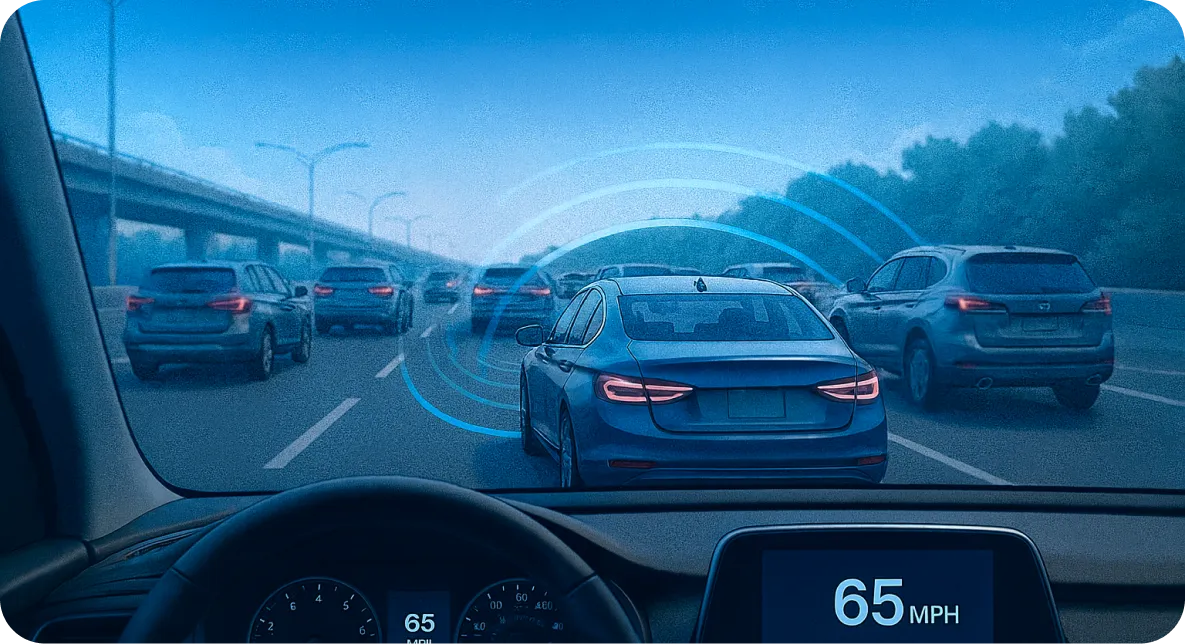
2. Automatic Braking
As distracted driving grows more frequent, it raises concerns for automakers and government agencies. In response, regulators want new vehicles to include automatic braking systems that spot pedestrians and cyclists. Computer vision plays a central role in this feature, helping vehicles avoid sudden stops when no obstacle is present to prevent rear-end crashes, while still accurately identifying people and cyclists. AI-powered vehicles possess the advantage of ongoing algorithm refinement to increase detection precision and road safety.
3. Autonomous Vehicles
Tech companies like Uber and Waymo, along with specialized delivery services and industrial robotics companies, invest significant resources into autonomous driving technology. As of summer 2025, self-driving vehicles remain in their early stages, with only a few thousand operating in controlled environments and specific geographic regions.
The rising interest in vehicle automation presents a promising opportunity and potential disruption for the automotive sector because full autonomy could lower the need for personal car ownership. However, that market shift remains far off. Today, autonomous driving remains an intense area of innovation.
Artificial intelligence powers this progress by combining advanced driver-assistance systems (ADAS) functions with even more sophisticated vision technology, predictive movement planning, behavior forecasting of nearby drivers, radar and LiDAR sensors, and detailed mapping. Self-driving cars represent a thrilling step forward and a key motivator for much of today’s AI research in mobility.
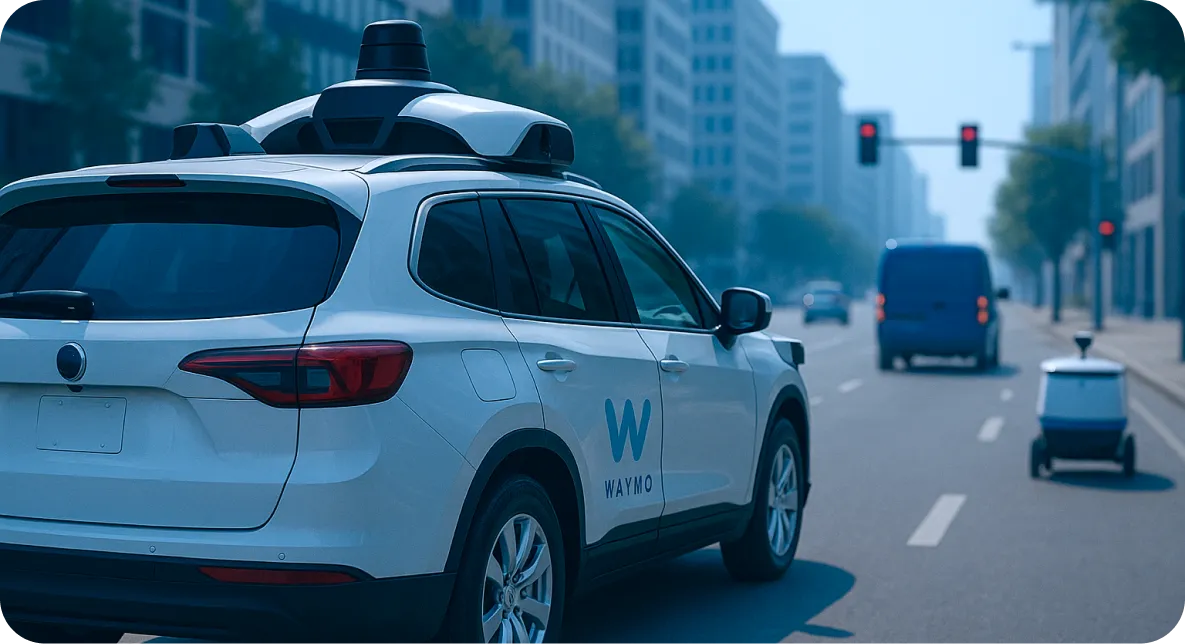
4. Battery Management Systems (BMS)
Innovations in battery management systems fueled by advanced analytics and AI continue to deliver steady progress. By combining traditional and AI-powered algorithms, BMS technology monitors battery health and detects underperforming cells.
This advancement improves vehicle safety by preventing the charging system from overloading weak cells. It also cuts costs by allowing more affordable production methods to still produce reliable, high-quality battery packs. Another major advantage of BMS involves faster charging and longer battery life through efficient load balancing and smarter charge control to reduce wear and tear.
5. Better Connectivity
Artificial intelligence enhances the connected car experience. It powers customized entertainment systems that adapt to your habits and deliver live traffic alerts. AI also delivers smooth syncing with your phone and other smart gadgets.
ADAS relies on AI to improve driving safety. These systems track the car’s environment, identify possible dangers, issue warnings, and take action autonomously during high-risk moments.
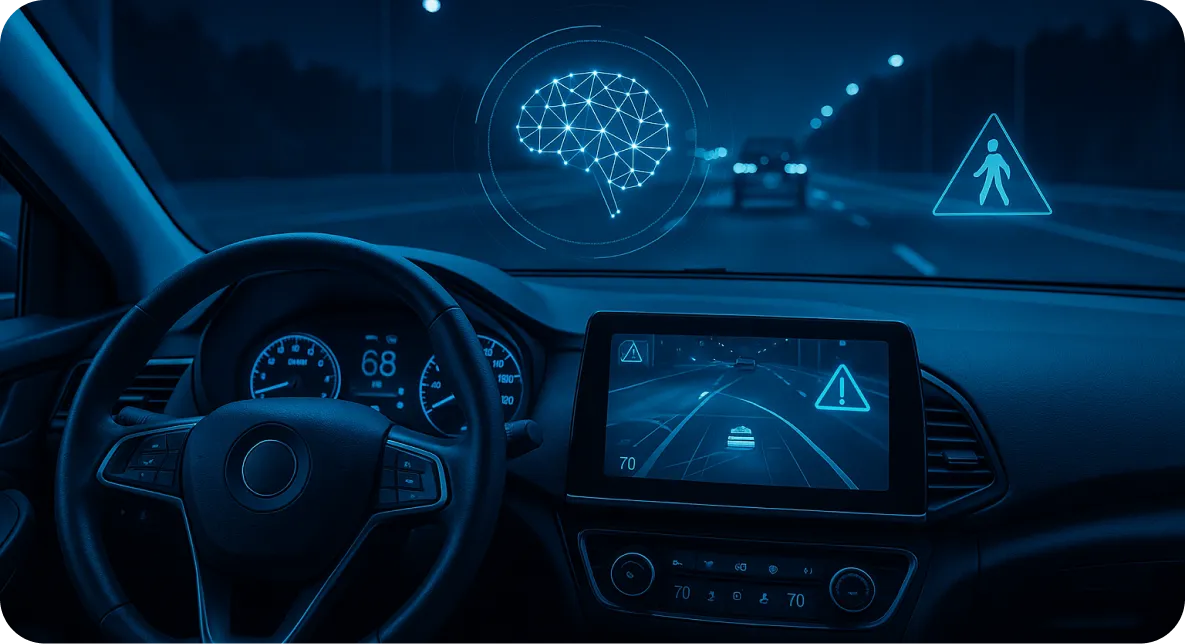
6. Enhanced Customer Experiences
AI enhances the automotive customer journey like never before. With intelligent chatbots, tailored suggestions, and digital assistants, automakers and dealers deliver more personalized, streamlined service.
Chatbots answer questions and provide instant support, while virtual assistants guide buyers through the car purchasing process step by step.
AI algorithms review customer information and offer customized product and service recommendations. This targeted approach delivers a more individualized experience for every user. AI insights also allow automakers to better understand their audience and refine their promotional strategies.
AI has altered how customers engage with car brands, delivering a smoother, more satisfying buying journey. Intelligent tools now assist buyers in choosing the ideal vehicle, offering personalized suggestions, and simplifying the entire purchasing process.
7. Fleet Coordination
Many vehicle fleet companies have connected systems with improved tools for managing operations more effectively. Delivery fleets made up of commercial vehicles have widely adopted fleet management solutions, though most still rely on traditional algorithms.
In the past three years, AI technologies have surged in this space, as fleet operators realize that AI delivers smarter route planning, better optimization, and more accurate decision-making.
These advanced features expand into other segments, including rental fleets and specialized service fleets. AI also enables real-time monitoring of sensitive cargo, such as temperature-controlled goods, ensuring proper handling and successful delivery. Likewise, autonomous vehicle systems already increase safety and efficiency in sectors like agriculture, construction, and mining.
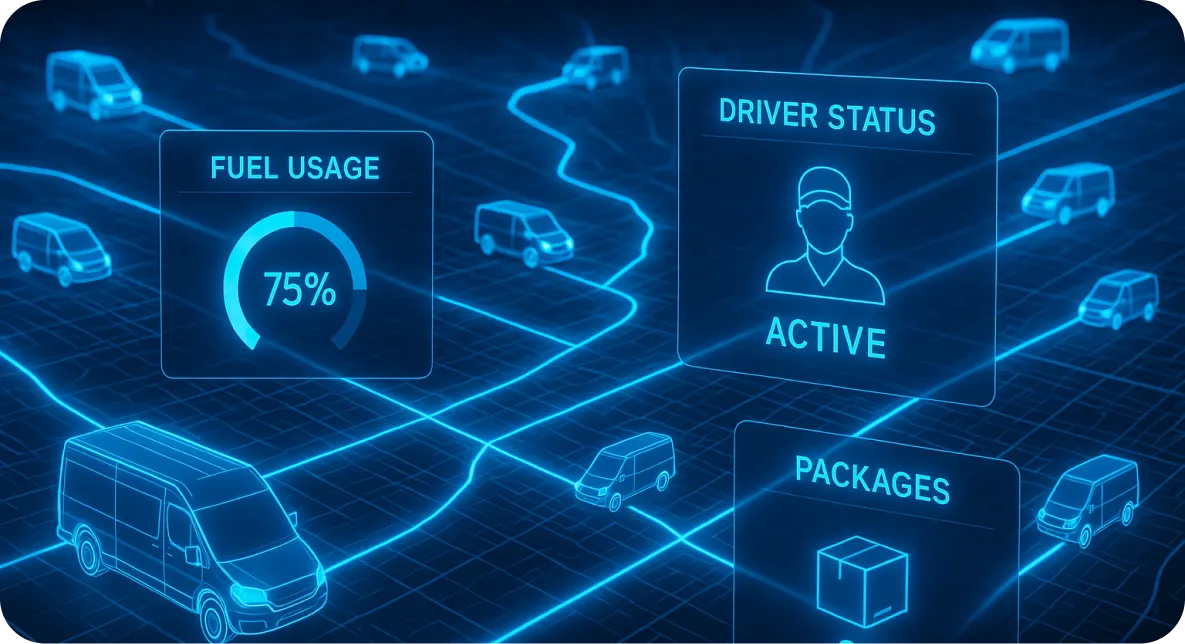
8. Heightened Battery Performance
Battery systems continue to evolve at a remarkable pace. A key application of artificial intelligence involves the fast-paced development of electric cars and energy storage solutions. Although car batteries may appear fully developed, they remain a focus of ongoing scientific exploration.
Breakthroughs in battery design and chemistry keep emerging, with AI pushing this research forward. Electric and hybrid vehicles rely on fresh innovations to boost range, lower the cost of ownership, and elevate safety standards.
9. Improved Manufacturing Efficiency and Quality Control
AI-powered robotics and automation transform car manufacturing by streamlining workflows, minimizing mistakes, and boosting efficiency. Intelligent algorithms process large datasets to spot bottlenecks, fine-tune assembly operations, and maintain exacting quality standards, thereby increasing output and reducing cost.
For instance, AI 3D printing speeds up the precise fabrication of intricate car components, minimizing time and manual effort compared to conventional manufacturing techniques. AI also supports predictive diagnostics and reliably spots flaws in vehicles before they hit the road.
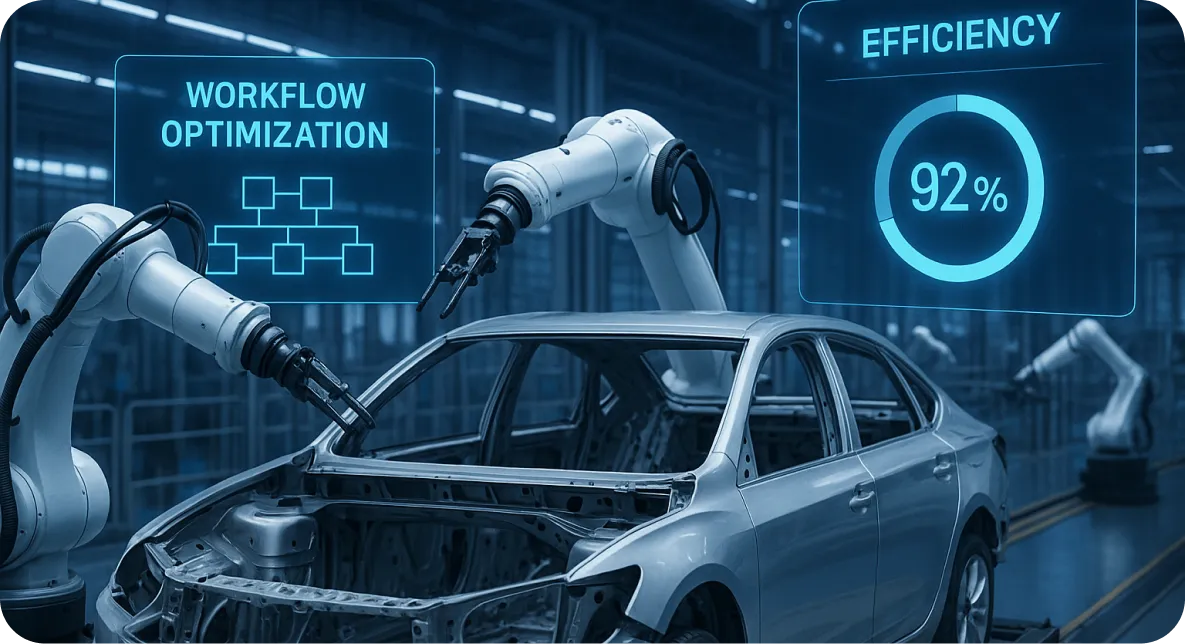
10. Instant Alerts and Predictive Maintenance
Nowadays, vehicle repair in the auto industry is mostly reactive. When something breaks, the driver visits the shop. Some systems trigger a malfunction indicator light (MIL) or check engine light to signal a problem. However, most alerts only activate after a component has already failed.
By monitoring more systems proactively, AI promotes predictive maintenance before issues arise. This approach improves the driver experience and allows dealership service teams to provide exceptional support, fostering customer trust and improving road safety.
While commercial fleets often use this technology to avoid costly downtime, it remains relatively rare in personal vehicles. As AI expands into more vehicle systems, predictive maintenance stands out as a promising and largely untapped advantage.
11. Intervehicle Communication
Communication between vehicles and the surrounding infrastructure remains in its early stages. The potential to ease traffic and have vehicles share data with one another opens the door to greater safety, improved driver support, and smoother travel.
In the United States, recent policy updates have officially approved new uses of cellular bandwidth for vehicle-to-everything technology (V2X). AI automation will likely push this advancement forward in the coming years.
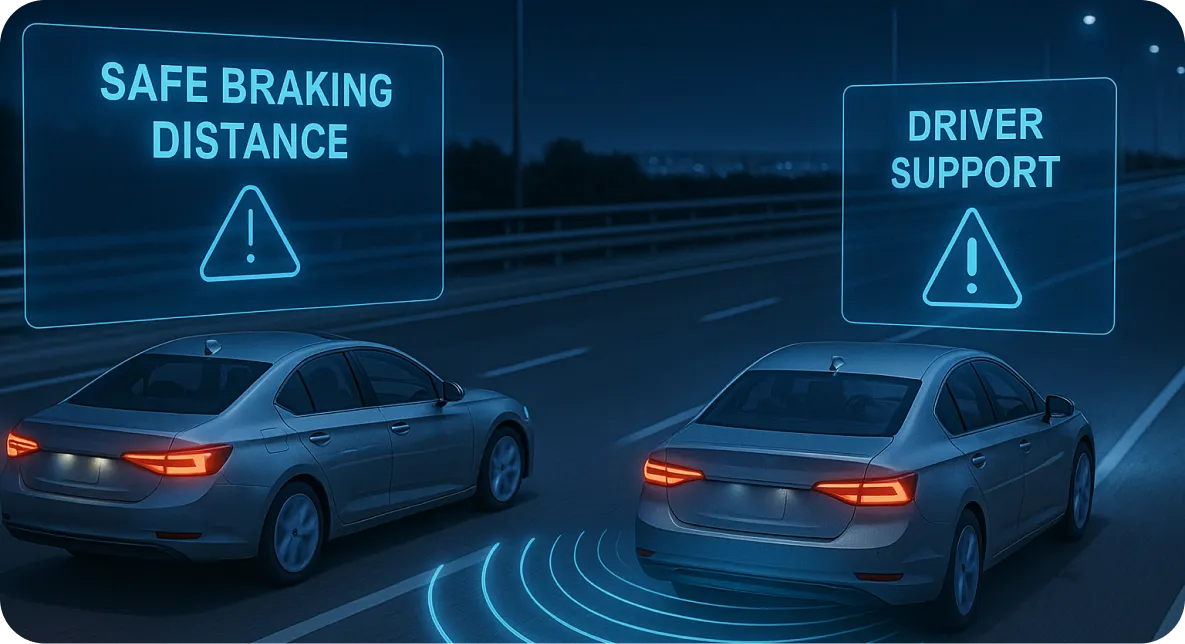
12. Lane Departure Warning and Automatic Lane Keeping
Another appealing use case for AI in the automotive industry is the development of automatic lane keeping and lane departure warning systems. These features rely on advanced camera systems to identify lane markings and communicate with the steering system, permitting the vehicle to make minor corrections, especially during highway driving.
Simpler versions do not steer the car but alert the driver when drifting occurs. Once AI-integrated vehicles enjoy greater adoption, these capabilities will likely become standard, offering a more comfortable, stress-free highway driving experience.
13. Optimal Aerodynamics
Simulated wind tunnels optimize aerodynamic performance and reduce fuel consumption. While computational aerodynamics and virtual testing have existed for years, integrating AI introduces fresh methods to uncover new ways of making vehicles glide more smoothly through the air.
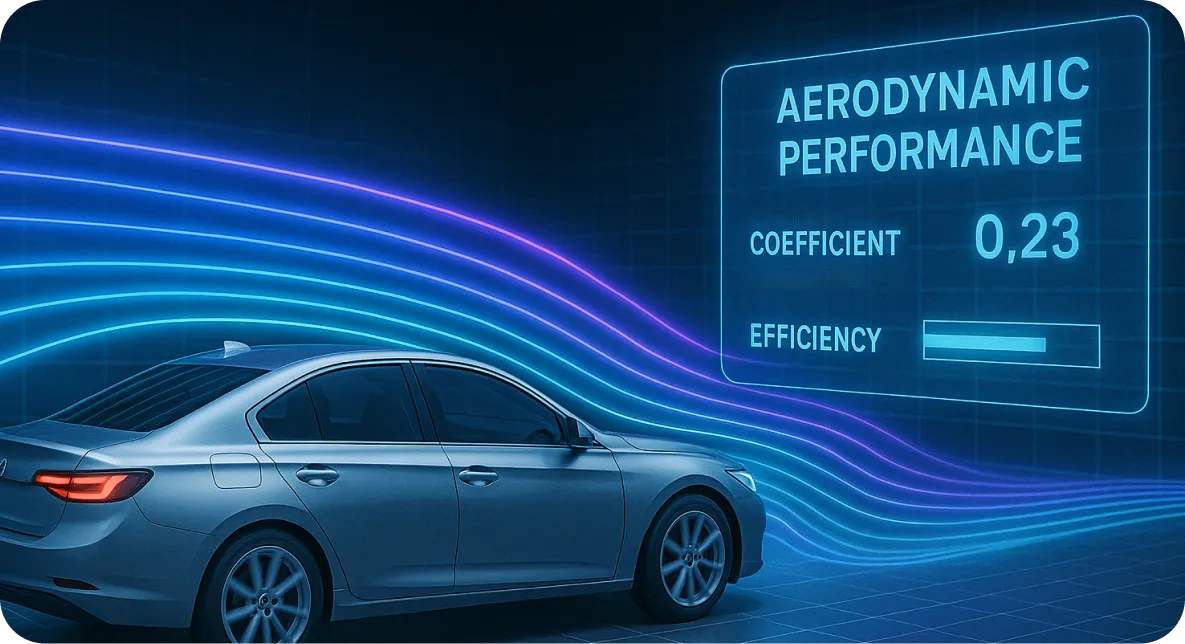
14. Optimized Supply Chain Management
In the auto sector, AI drives major changes in supply chain operations. With intelligent algorithms, car manufacturers can accurately forecast demand, streamline stock management, and optimize production scheduling. These innovations have made supply chains more efficient and budget-friendly, benefiting producers and buyers.
AI also examines information from multiple channels, including social media, weather forecasts, and market signals. Automakers use these insights as part of their plans for transforming automotive manufacturing, logistics, and pricing strategies.
AI automation and data processing lower the chances of human error while increasing the speed and accuracy of managing automotive supply chains. As these technologies progress, innovations will support smoother, more efficient supply chain operations.
15. Redesigned Tire Tread
Modern tire innovations now use advanced AI optimization to boost grip, reduce wear, and speed up materials research. Tread wear analysis has become highly sophisticated and continues to evolve. AI design methods improve traditional techniques by spotting patterns that increase traction on various road surfaces.
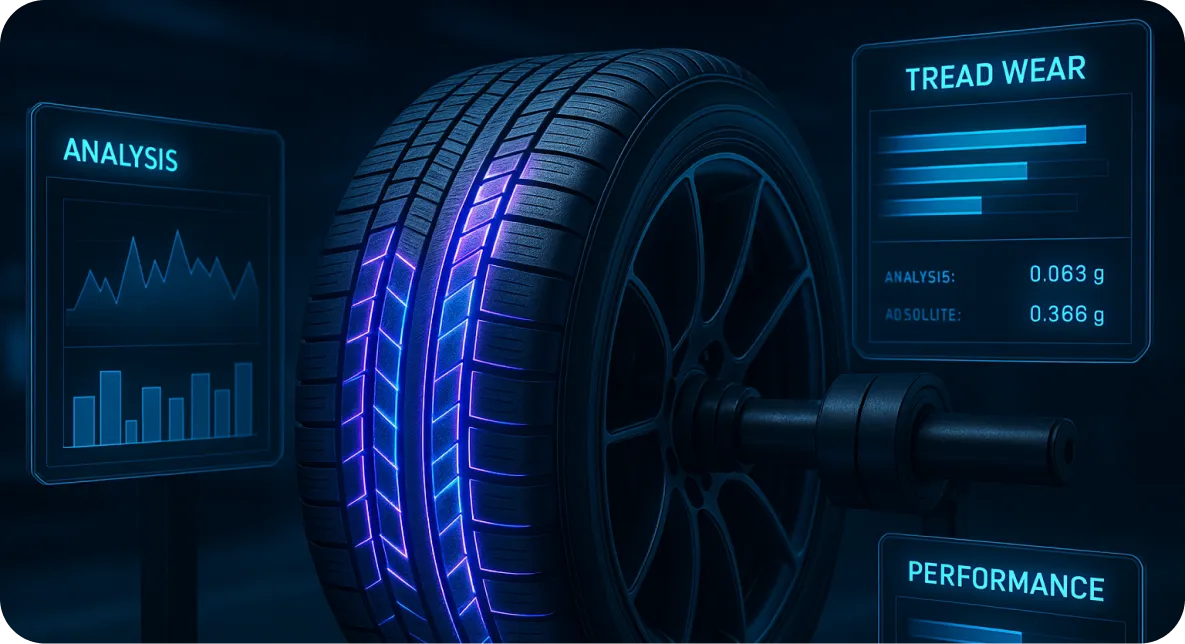
16. User Detection for Tailored Experiences
Vehicle customization is becoming a thrilling focus as drivers seek cars that match the flexibility and personalization they enjoy with mobile devices. Leading automakers are rolling out features that let users adjust far more than mirrors and seat positions.
AI in the automotive sector allows vehicles to recognize driving habits and recommend settings based on different scenarios. These intelligent algorithms augment the user experience with tailored suggestions and provide manufacturers with valuable insights into how consumers use their vehicles’ various features, informing future design decisions.
Challenges Presented by Artificial Intelligence in Cars
Artificial intelligence in the automotive sector sparks a few security concerns. One issue involves the risk of hacking and cyberattacks targeting AI-integrated vehicles. Since AI manages sensitive information and core vehicle functions, protecting these systems from digital threats is essential.
AI in autonomous vehicles also raises ethical concerns. Questions about accountability in the event of an accident demand clear answers. As AI-powered systems advance, car manufacturers must thoughtfully examine these challenges and put measures in place to minimize danger.
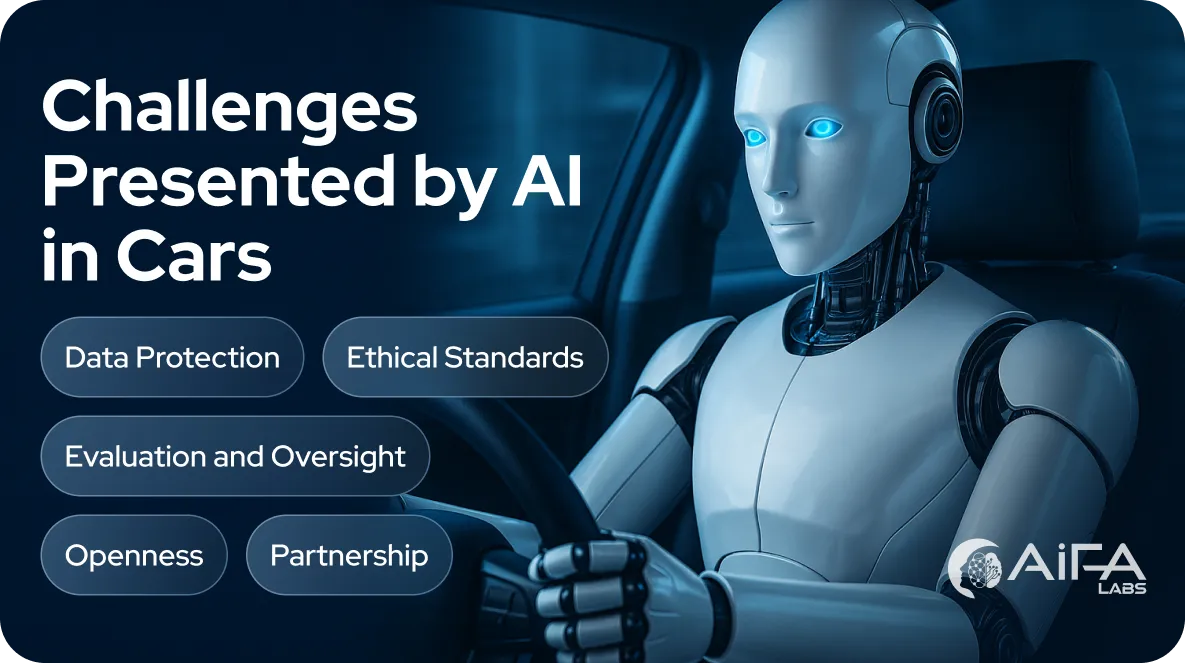
Some of the ways the automotive industry can assuage these worries about AI implementation include:
- Data Protection — Protecting personal information is a key issue for AI in vehicles. Automakers can enforce strict privacy policies and gather only the data needed for safe driving. They should also clearly explain how they use the data and give users control over their personal information.
- Ethical Standards — Car makers can create and follow clear moral frameworks for using AI. These rules should define the duties of manufacturers, drivers, and regulators in promoting the safe, responsible use of autonomous vehicles. They should also cover topics like fault and liability when accidents occur.
- Evaluation and Oversight — Automakers should conduct thorough testing and work with government bodies to regulate vehicles before releasing them to the public. This process confirms the dependability and security of the technology.
- Openness — By clearly explaining the algorithms and reasoning behind these systems, automakers can foster trust and help people better understand how AI-powered vehicles function.
- Partnership — Cooperation among automakers, government bodies, and other key players can resolve ethical issues tied to AI in autonomous vehicles. Working together promotes diverse viewpoints and practical solutions.
23 Real-World Examples of AI in Automotive
AI revolutionizes the automotive industry’s manufacturing, design, safety, logistics, and mobility systems. From self-driving taxis to predictive maintenance systems to intelligent voice assistants, AI applications improve vehicle performance, streamline operations, and create better customer experiences. These innovations span factory floors, roads, and even last-mile delivery, signaling a future where artificial intelligence drives automotive advancement at every level. Let’s take a look at 23 real-world examples of AI in automotive.
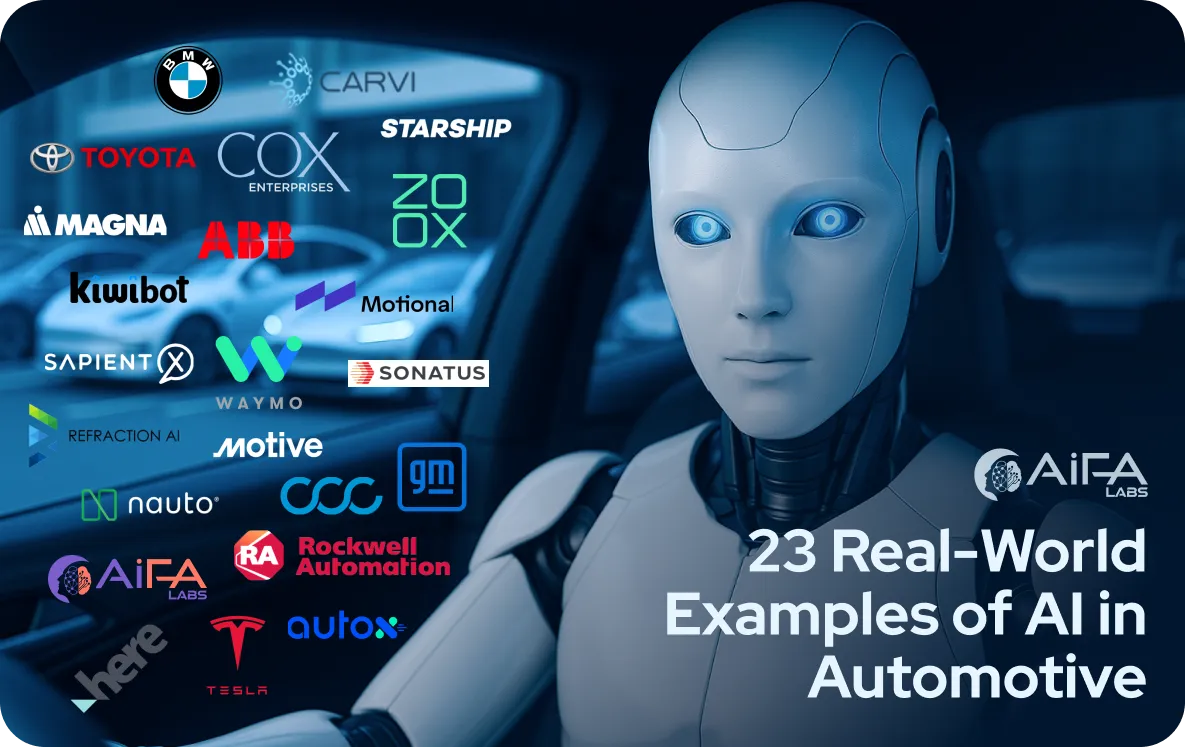
1. AiFA Labs
Through the Cerebro Generative AI Platform, AiFA Labs offers a comprehensive suite of AI solutions that automobile manufacturers can use to improve operations. BMW, Ford, Honda, Nissan, and Porsche are among the many automotive leaders that currently use SAP software for Enterprise Resource Planning (ERP) and Supply Chain Management (SCM), specifically S/4HANA.
Cerebro SAP AI SDLC Assist (SASA) automates the SAP software development lifecycle from start to finish, helping manufacturers speed up their deployments while reducing the cost of their projects. AiFA Labs’ Edge Vision AI Platform also provides enhanced security and employee tracking for car companies looking to tighten up business processes on the factory floor.
2. ABB
ABB provides a range of AI robotic solutions, including manufacturing robots in the automotive industry. The company’s collaborative robots operate beside human workers to inspect auto parts, apply paint, and perform other tasks. These robots detect nearby personnel and objects so AI systems learn when to pause movement for safety. ABB plans to roll out a generative AI platform designed to help companies turn raw data into meaningful insights.
3. AutoX
AutoX builds consumer-focused autonomous vehicles by blending AI software, sensor systems, live camera feeds, and extensive testing to support safe driving decisions. The company has rolled out its robotaxi services in China and earned approval to begin a pilot robotaxi program in California. More recently, AutoX obtained Shanghai’s first license for fully driverless passenger transport as it aims to provide airport shuttle services.
4. BMW Group
BMW Group, a German automaker renowned for its premium cars, has embedded AI into its manufacturing process. Its setup permits vehicles to transmit real-time data and system updates to factory staff. Team members track each car’s progress and spot issues during assembly. BMW partnered with Monolith, adopting its AI platform to accelerate vehicle design and development.
5. CARVI
CARVI builds an AI-powered ADAS that delivers driving insights and instant warnings to alert drivers to potential risks, such as veering out of lanes, head-on crashes, and hazardous road conditions. The system also scores driver behavior to highlight poor habits and encourage safer practices. CARVI easily integrates with existing cars, helping fleet operators monitor vehicles, capture dashcam footage of incidents, access performance reports, and lower insurance costs by promoting safer driving.
6. CCC Intelligent Solutions
CCC promotes smarter choices in the automotive and insurance industries using AI, IoT, and workflow technologies. CCC Intelligent Solutions links carmakers to a data stream that reveals useful insights from insurers and repair shops, while also giving them access to a network of over 30,000 repair centers across the country. This connectivity increases transparency and supports efforts to build safer, longer-lasting vehicles.
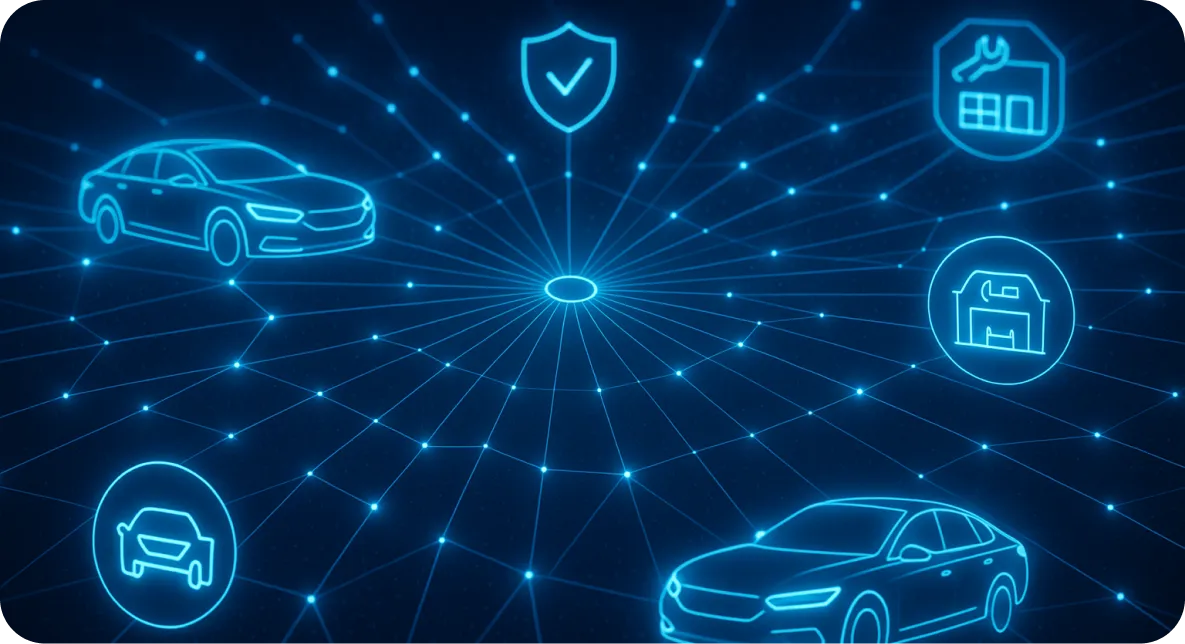
7. Cox Enterprises
Cox Enterprises owns Cox Automotive, which has several brands dedicated to developing advanced tools for the auto retail industry. One brand, Manheim, uses an AI platform called M LOGIC that prices vehicles accurately for dealerships, boosts earnings, and matches buyers with the right inventory. Another brand, vAuto, provides a solution called Stockwave to help dealers expand their pre-owned vehicle stock.
8. General Motors
General Motors engineers, builds, and markets passenger cars and trucks. The company has integrated AI into its manufacturing operations, using predictive analytics to review performance data and spot possible problems. In its vehicles, General Motors applies AI algorithms for smart route planning to ease EV drivers’ preoccupation with range, while conversational AI supports OnStar’s virtual assistant. GM also relies on AI to conduct software testing for vehicle safety.
9. HERE Technologies
HERE applies artificial intelligence to power its mapping technology. It creates high-precision maps around the globe and focuses on advancing software-defined vehicles. HERE Technologies also serves clients in the logistics, technology, and transportation industries.
10. Kiwibot
Kiwibot offers a robotic, last-mile food delivery system, operating over 450 AI-driven, fully electric robots on 30 campuses in the United States. Users can order meals through an app and follow their robot delivery on their mobile devices. Customers can also customize Kiwibots for specialized tasks, such as moving goods in warehouses or functioning as mobile advertising displays.
11. Magna International
Magna International, a mobility technology firm and automotive supplier, integrates AI into its production processes and self-driving systems. The company fits its vehicles with thermal sensors powered by convolutional neural networks (CNNs) to identify pedestrians by body heat. On the factory floor, Magna has partnered with Sanctuary AI to introduce versatile AI robots into its operations, building on its existing use of artificial intelligence for predictive maintenance and thoughtful decision-making.
12. Motional
A collaboration between Aptiv and Hyundai, Motional develops self-driving capabilities that combine radar, LiDAR, and camera sensors to promote safety. This approach led to the launch of the world’s first robotaxi pilot and a fully operational commercial robotaxi service, which has completed over 140,000 autonomous trips without a single at-fault accident.
13. Motive
Motive develops hardware and software tools that companies use to oversee their vehicle fleets. Its solutions increase efficiency and safety. For instance, Motive’s AI Dashcam reduces collisions by spotting risky driving behaviors, such as tailgating and speeding, and provides drivers with instant warnings.
14. Nauto
Nauto designs an innovative driver safety system that minimizes distractions and lowers crash risks by analyzing driving habits. It uses real-time visual data to keep drivers focused, helping them avoid accidents and traffic offenses. Through video monitoring and facial recognition, Nauto also helps businesses handle insurance claims faster and more effectively.
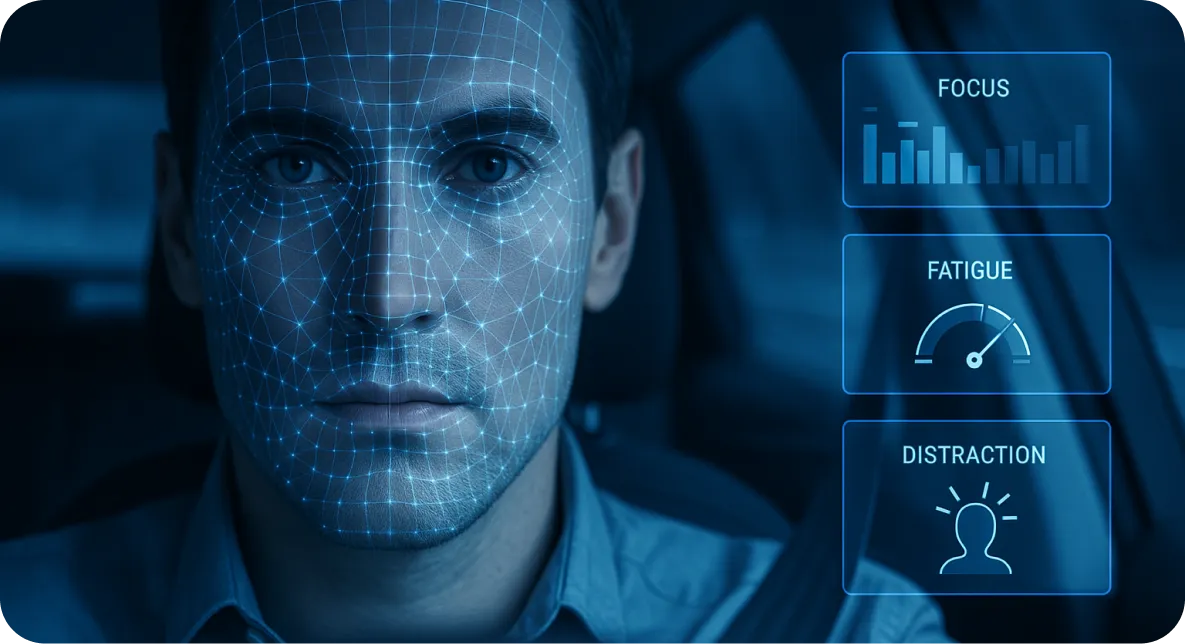
15. Refraction AI
Refraction AI builds robotic, autonomous delivery vehicles for last-mile transport from businesses like restaurants, drugstores, and supermarkets. Its primary vehicle, the REV-1, runs in any weather and can navigate car and bike lanes to speed up deliveries while avoiding traffic disruption. Equipped with advanced AI for optimal route planning and affordable sensors for quick stops, the REV-1 offers a safe, compact, and scalable solution for self-driving deliveries.
16. Rockwell Automation
Rockwell Automation integrates AI into its factory robots to support vehicle assembly. These machines can build entire cars, apply paint, and install complex components. Rockwell also delivers AI tools for tire manufacturing and electric vehicle production. Through its collaboration with NVIDIA, Rockwell Automation aims to improve the intelligence and performance of its robotic systems.
17. SapientX
SapientX creates white-label software that brings voice interaction and intelligent features to tech products, including in-car assistants for brands like Volvo, Mitsubishi Marelli, and Visteon. SapientX focuses on embedding natural conversational AI into vehicles by using voice recognition, speech generation, natural language understanding, and intelligent avatars to better interpret context, complex phrasing, emotions, and driver preferences.
18. Sonatus
Sonatus delivers AI tools for software in cars, including its Automator AI and Collector AI products. Automator AI allows vehicles to recommend personalized settings by analyzing driver habits and gives automakers useful insights for product improvement.
19. Starship Technologies
Starship Technologies develops autonomous delivery robots that travel at a walking pace, using GPS and AI to steer around barriers while transporting parcels, food, and groceries to customers who order through the Starship app. Each robot weighs 55 pounds unloaded and features a secure cargo hold that stays locked until the customer unlocks it using the app.
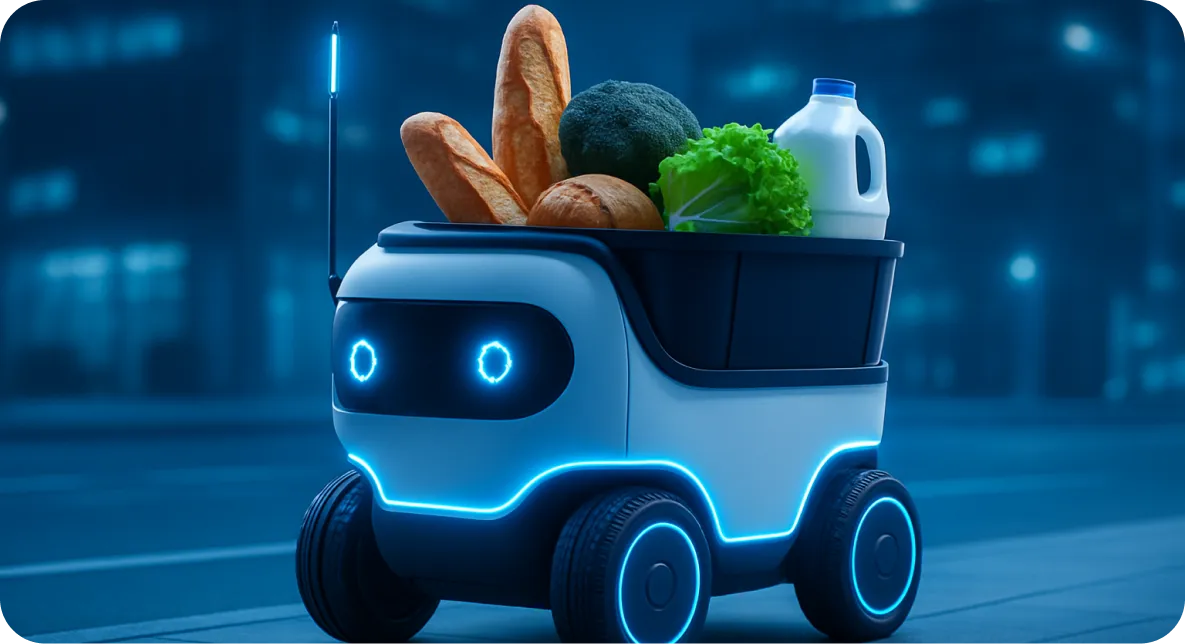
20. Tesla
Tesla manufactures electric vehicles fitted with Autopilot, its advanced driver-assistance system that handles steering, speed control, braking, lane shifts, and parking. The feature is designed for use by an alert driver who keeps their hands on the wheel and is ready to take control at any time.
21. Toyota
Toyota teamed with Nippon Telegraph and Telephone (NTT) to develop infrastructure and an AI mobility platform. Toyota’s system collects data and sends it to driver-assist technologies, helping autonomous vehicles handle tasks like highway merging. The project expands on their earlier collaboration regarding 5G-connected vehicles and moves them closer to achieving their goal of well-connected smart cities.
22. Waymo
Originally launched as Google’s self-driving car project, Waymo has grown into an independent company building autonomous vehicles. Leveraging advancements in large language models, the company developed a more sophisticated system called the Waymo Foundation Model, designed to augment its driving tech with more thoughtful planning and other advanced capabilities. In 2024, Waymo completed over four million fully autonomous rides and intends to start trials in Tokyo.
23. Zoox
While some firms upgrade existing cars with autonomous features, Zoox builds robotic rideshare vehicles entirely from the ground up. Each unit operates using an array of sensors, radar, and onboard computing that supports rapid decision-making. To prioritize safety, Zoox equips its vehicles with the ability to detect objects over 150 meters away in all directions and even perceive around corners. The company currently tests its technology in San Francisco.
Check Out the Latest Automotive AI Technologies From AiFA Labs
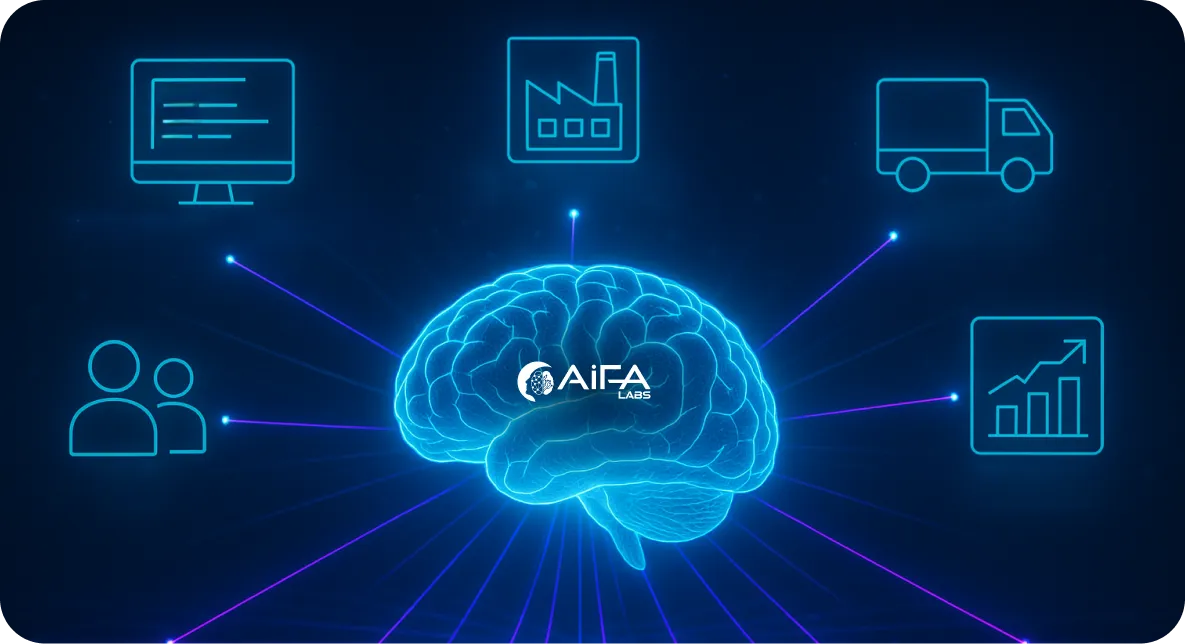
We designed the Cerebro Generative AI Platform to elevate the performance of every department at large, multinational corporations. To speed up the software development lifecycle and monitor the factory floor at your automotive manufacturing plant, book a free demo online or call AiFA Labs at (469) 864-6370 today.




